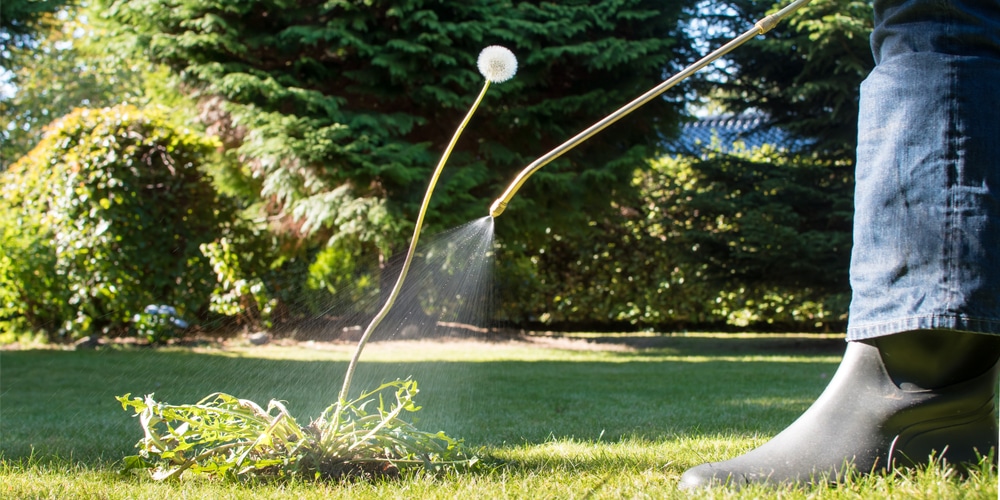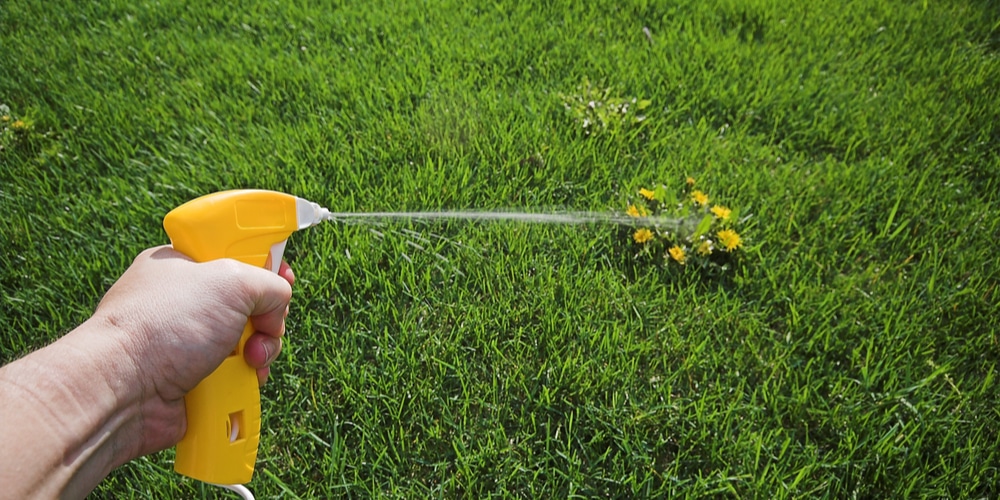If you’re looking for an effective herbicide in which to get rid of weeds, you may be wondering whether to use Crossbow or Roundup. These products will both kill weeds but are designed for very different purposes. Before making a decision about which product to buy, you’ll need to identify the weeds you want to kill.
Crossbow is a broadleaf herbicide that’s used to kill dandelions, ivy, vines, brambles, and shrubs. Crossbow is selective and will only kill certain types of plants without damaging your lawn. On the other hand, Roundup is used to kill all types of weeds and kill any plant, weed, or grass that it comes into contact with. Let’s compare Crossbow vs. Roundup to help you decide which is best for your needs.
Common Uses: Crossbow vs. Roundup

Crossbow and Roundup are both very useful herbicides that are suitable for different purposes. Crossbow kills woody plants and is mainly used on fence lines and in drainage ditches to get rid of brambles, poison ivy, tough brush, and other shrubs. It can also be used on lawns to kill dandelions, clover, chickweed and won’t kill the grass. It also won’t harm grassy weeds such as crabgrass.
Roundup is known as a non-selective herbicide which means that it will kill all plants and weeds it has contact with. If used on your lawn, it will kill the weeds and kill the grass surrounding the weeds. Roundup may affect Brambles but isn’t as effective at killing woody plants as Crossbow is.
Both these products are post-emergent herbicides, which means that they kill mature weeds and won’t kill any seeds that are lying dormant. For this reason, you may find that new weeds reappear after using the products.
Active Ingredients: Crossbow vs. Roundup
Crossbow kills weeds using too active ingredients that don’t affect grasses. These are Triclopyr and 2 4 D. These ingredients are powerful enough to kill even the toughest woody plants but can also be used on lawns without killing the grass. The downside of Crossbow is that it doesn’t kill grass-like pests such as crabgrass, and if you accidentally spray it near trees, shrubs, or garden plants, you’ll kill them.
Roundup is specially formulated using Glyphosate, which means it can attack all kinds of plants. If you use roundup on your lawn, you’ll end up with bare patches, which you’ll then need to reseed. It’s, therefore, best to only use Round up if you need to clear your entire lawn and want to get rid of the weeds and grass. It’s also a great product to use on weeds that are growing in the cracks of patios, driveways, or sidewalks.
Crossbow and Roundup on Dormant Weeds
Crossbow can be used during the fall or winter on dormant weeds as it contains ingredients that can infiltrate weeds leaves, roots, and bark while they are dormant. Roundup works by being absorbed by the plants during the photosynthesis process, so is ineffective when used on dormant plants.
How to use weed killers
Always follow the manufacturer’s instructions when using any type of weed killer. You may also need to wear protective clothing. Crossbow is generally fast-acting and will kill plants in three to five days, while Roundup takes at least a week. Roundup is most effective when used in the spring, while Crossbow can be used year-round.
After spraying Crossbow on weeds, you’ll need to let it dry and be absorbed by the plants for at least six hours. After this time, you can water the plants so that the solution gets absorbed by the roots. Don’t apply Crossbar if rain is forecast.
Roundup takes just thirty minutes to become rainfast. When working with Crossbow or Roundup, you should only spray on a wind-free day so that the solution doesn’t get blown onto other plants.
Conclusion
Crossbow and Roundup are both very effective herbicides that are used for slightly different purposes. If you want to kill tough woody plants such as ivy or brambles without destroying your lawn, you can use a crossbow. This product is also beneficial for dandelions and clover. There are a lot of ways to kill weeds. Boiling water, ammonia, or even apple cider vinegar can be used.
If you’re looking to kill common weeds such as crabgrass, you may like to use Roundup. Remember that Roundup will also kill the grass, so you’ll need to spot treat weeds.

